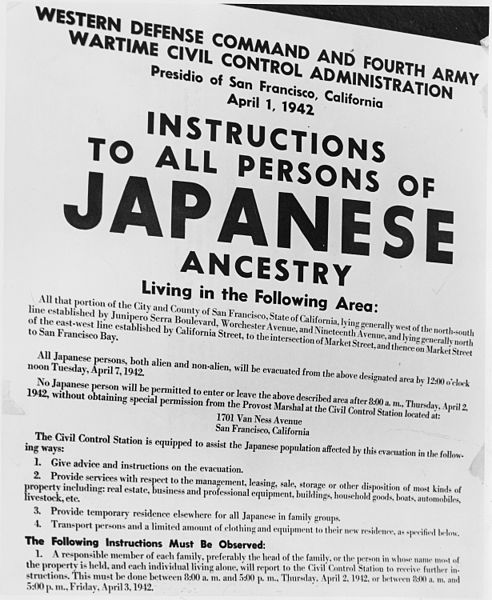Some thoughts on the Internment of the Japanese

One of the first dates I had with my husband, was a trip to see Min Yasui, one of the plaintiffs in a suit related to the Korematsu case trying to fight the internment of the Japanese by the U.S. government during World War II. I was young, maybe still 18 at the time. I knew a bit about the history of the internment, but not a lot. Mr. Yasui was impressive. Even in advanced age, his personality crackled. It was a good lesson for me on the failure of stereo-typing, as he was a firebrand, fitting with his occupation as a lawyer.
Why do I bring this up? Well, recent news has someone close to the Trump campaign (but not in his transition) citing Korematsu as precedent, which drew a gasp from Megyn Kelly. This is not surprising, as currently, the case is generally felt to be embarrassing, and a mistake. Don’t believe me? Here’s quote showing how far the idea that Korematsu was a bad decision has penetrated legal circles:
Justice Antonin Scalia has ranked Korematsu alongside Dred Scott, the 1857 decision that black slaves were property and not citizens, as among the court’s most shameful blunders.
That was recognized in 1983 shortly before I heard Mr. Yasui speaking. I remember at the time they were discussing the fact that the Korematsu had gotten his original conviction overturned, but since it was only at the appellate level, the original ruling still stood at the Supreme Court level. They actually wanted the case to advance, because they felt the time was ripe to have it overturned. It didn’t, so it’s still sitting out there are precedent. This article explains some of the legal niceties, and includes this surprising quote about Scalia above.
I remember as I was in my 20s running into folks in my grandmother’s Reflections on Teaching » Blog Archive » Some thoughts on the Internment of the Japanese:
Trump surrogates are already citing Japanese internment camps from WW II as "precedent" for Muslim registry pic.twitter.com/DVnjtom0mc— Brendan Karet (@bad_takes) November 17, 2016
